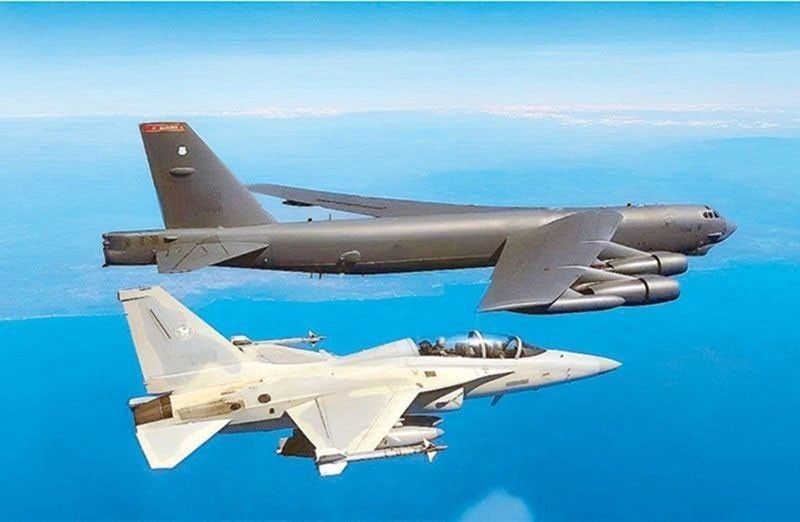PAF patrols to continue amid China no-trespass rule

MANILA, Philippines — The Philippine Air Force (PAF) said yesterday it will continue to conduct maritime patrols over the West Philippine Sea (WPS), even as China implements the new Chinese coast guard rules to detain foreigners for trespassing in the disputed South China Sea.
Air Force spokesperson Col. Maria Consuelo Castillo said that conducting maritime patrols over Philippine territorial waters and features within its exclusive economic zone (EEZ) is part of the Air Force’s inherent duty to protect Filipinos.
Castillo said it is important for Filipinos, particularly fishermen to feel the presence of the PAF in the EEZ.
“It is an inherent duty of the Philippine Air Force to conduct maritime patrol over our territorial waters and the areas within our exclusive economic zone. The most important thing is for our fishermen to feel that the PAF is there for them,” she said in an interview on dzBB.
“Our maritime patrol continues, to ensure that we monitor all activities both in the air and on the sea, here in our exclusive economic zone and our territorial waters,” Castillo said.
She said the PAF has started using drones to monitor the country’s territorial waters.
“Aside from manned aircraft, we are now also using unmanned aerial vehicles in monitoring different areas of interest,” Castillo added.
Armed Forces of the Philippines chief Romeo Brawner urged Filipino fishermen to keep fishing in the country’s EEZ in the South China Sea, despite China’s new coastguard rules which took effect on June 15, and he gave assurance that Philippine authorities are “discussing a number of steps to be undertaken in order for us to protect our fishermen.”
China claims almost the entire South China Sea, as Beijing continues to refuse to honor the international ruling that declared its claims have “no legal basis.”
Cause for concern
The Philippines expressed serious concern over China’s new coast guard regulations, which say they can detain foreigners “suspected of violating management of border entry and exit,” with detention lasting up to 60 days in “complicated cases.”
President Marcos last month called the new rules a “very worrisome” escalation.
China Coast Guard (CCG) vessels have used water cannons against Philippine boats multiple times in the contested waters, where collisions have injured Filipino soldiers.
Manila warned Beijing it would be in direct violation of international law if it enforces the regulations in the waters and maritime features of the illegal 10-dash line that covers areas in the West Philippine Sea.
The new rules would also enforce a 2021 law explicitly allowing the CCG to fire on foreign vessels.
The United States said the “purported regulations” raised significant legal concerns.
Chinese “domestic law has no applicability to other states’ flagged vessels in other states’ exclusive economic zones or in the high seas,” a US State Department spokesperson told AFP. “Enforcement would be highly escalatory and detrimental to regional peace and security.”
The official said Washington “unequivocally rejects” China’s “sweeping and unlawful maritime claims” in the South China Sea.
“We’ve urged Beijing – and all claimants – to comport their maritime claims with international law,” the spokesperson said.
Criticism from the G7
The Group of Seven bloc on Friday criticized what it called “dangerous” incursions by China in the waterway.
“We oppose China’s militarization, and coercive and intimidation activities in the South China Sea,” read a G7 statement at the end of a summit on the weekend.
The South China Sea is a vital waterway, where Vietnam, Malaysia and Brunei also have overlapping claims in some parts.
Most recently, however, confrontations between China and the Philippines have raised fears of a wider conflict over the sea that could involve the US and other allies.
Trillions of dollars in ship-borne trade passes through the South China Sea annually, and huge unexploited oil and gas deposits are believed to lie under its seabed, though estimates vary greatly. The sea is also important as a source of fish for growing populations.
China has defended its new coast guard rules. A foreign ministry spokesman said last month that they were intended to “better uphold order at sea.”
And the Chinese defense minister warned this month that there were “limits” to Beijing’s restraint in the South China Sea.
China has also been angered in the past by US and other Western warships sailing through the South China Sea.
The US Navy and others undertake such voyages to assert the freedom of navigation in international waters, but Beijing considers them violations of its sovereignty.
Chinese and US forces have had a series of close encounters in the South China Sea.
- Latest
- Trending































